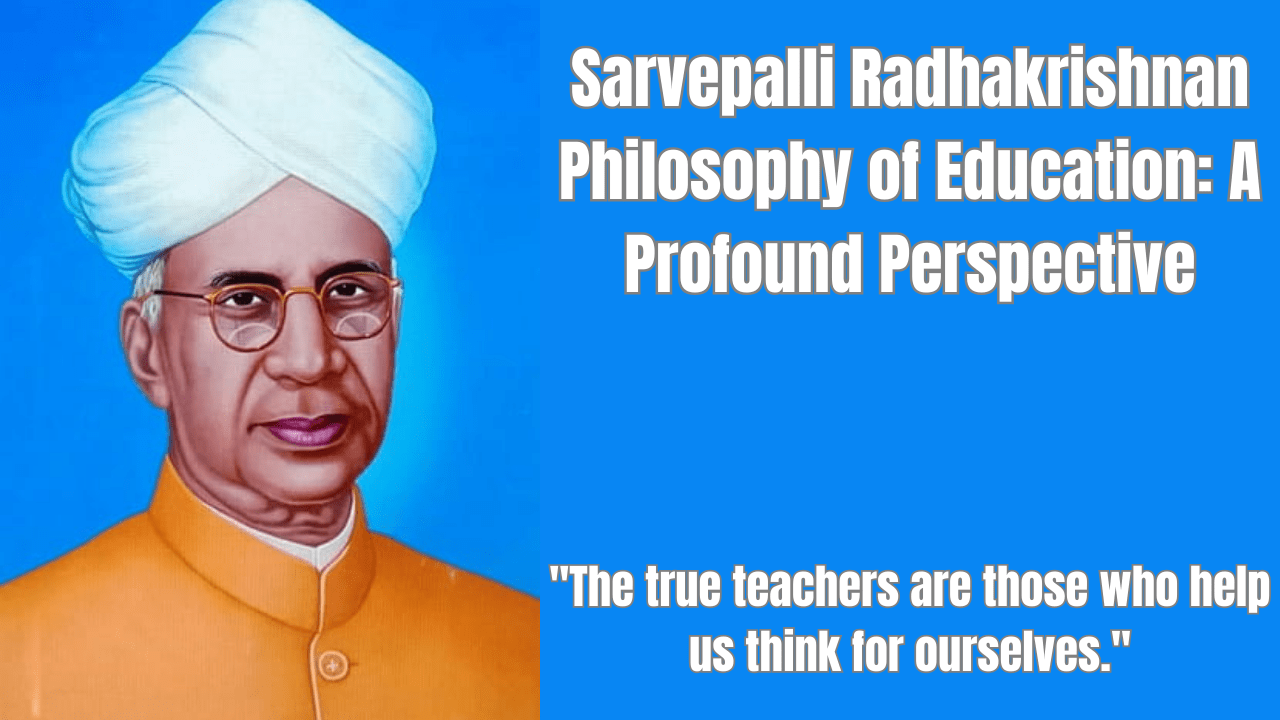Introduction
Sarvepalli Radhakrishnan, a visionary philosopher and the second President of India, made significant contributions to the realm of education. His philosophy of education is a beacon of wisdom that continues to guide educators and learners alike. In this comprehensive article, we will delve deep into Sarvepalli Radhakrishnan’s philosophy of education, uncovering its core principles and its enduring relevance in today’s educational landscape.

The Life and Legacy of Sarvepalli Radhakrishnan
Early Life and Education
Sarvepalli Radhakrishnan was born on September 5, 1888, in Tiruttani, India. He displayed exceptional academic prowess from an early age, and his thirst for knowledge led him to excel in his studies.
Academic Achievements
Radhakrishnan’s academic journey was marked by excellence. He earned a Bachelor’s degree in Philosophy from Madras Christian College and later pursued a Master’s degree in the same field from the University of Madras. His passion for philosophy grew, leading him to complete a Doctorate in Philosophy from the University of Oxford, where he studied under the renowned philosopher G.E. Moore.
“Knowledge gives us power, love gives us fullness.”
Sarvepalli Radhakrishnan Philosophy of Education
Sarvepalli Radhakrishnan’s philosophy of education is rooted in his profound understanding of life, society, and human nature. It is a holistic approach that goes beyond the mere transmission of knowledge. Let’s explore the key facets of his educational philosophy:
Read this
Holistic Development
Radhakrishnan believed that education should nurture not only the intellect but also the heart and soul of an individual. He emphasized the holistic development of a person, aiming to produce well-rounded individuals capable of contributing positively to society.
Individualized Learning
One of the cornerstones of Radhakrishnan’s philosophy is individualized learning. He recognized that each student is unique, with distinct strengths and weaknesses. Therefore, education should be tailored to the needs and interests of each learner, fostering their innate talents.
Moral and Ethical Values
Radhakrishnan stressed the importance of imparting moral and ethical values in education. He believed that education should instill in students a strong sense of morality, integrity, and social responsibility.
Critical Thinking
According to Radhakrishnan, education should cultivate critical thinking and the ability to question. He encouraged students to develop a questioning mindset, promoting curiosity and a thirst for knowledge.
Real-Life Application
Radhakrishnan’s philosophy emphasized the practical application of knowledge. He believed that education should equip students with skills and knowledge that are directly applicable to real-life situations, preparing them for the challenges of the world
Sarvepalli Radhakrishnan’s philosophy of education continues to hold immense relevance in contemporary times. It serves as a guiding light for educators and policymakers worldwide. Here are some insights into its enduring significance:
- Global Perspective: Radhakrishnan’s philosophy transcends cultural and geographical boundaries, offering a universal approach to education that can be applied in diverse settings.
- 21st-Century Skills: In an era where skills such as critical thinking, problem-solving, and adaptability are highly valued, Radhakrishnan’s emphasis on holistic development and practical knowledge aligns perfectly with the needs of the 21st century.
- Character Building: With the growing concern over the erosion of moral values, Radhakrishnan’s focus on moral and ethical education is more relevant than ever, helping to shape responsible and compassionate individuals.
“Reading a book gives us the habit of solitary
reflection and true enjoyment.”
Relevance in Contemporary Education
Holistic Learning
In today’s fast-paced world, Radhakrishnan’s emphasis on holistic development remains relevant. Educational institutions worldwide are recognizing the importance of nurturing emotional intelligence and ethical values alongside academic excellence.
Interdisciplinary Studies
The call for interdisciplinary studies aligns with Radhakrishnan’s vision of integrating knowledge. Universities and colleges are increasingly offering programs that encourage students to explore multiple disciplines, fostering a more comprehensive understanding of the world.
Teacher-Student Dynamics
The teacher-student relationship remains at the heart of effective education. Educators are encouraged to adopt mentoring roles, guiding students not only in academics but also in personal and ethical development.
Practical Education
In an ever-changing job market, practical education has gained prominence. Institutions are now focusing on equipping students with real-world skills that enhance their employability.
FAQs (Frequently Asked Questions)
1. What is the core principle of Sarvepalli Radhakrishnan’s philosophy of education? Radhakrishnan’s core principle is the holistic development of individuals, encompassing their intellect, morality, and practical skills.
2. How does Radhakrishnan’s philosophy cater to individual differences in learners? Radhakrishnan advocated for individualized learning, recognizing and nurturing each student’s unique strengths and weaknesses.
3. Why is moral and ethical education crucial in Radhakrishnan’s philosophy? It is essential because Radhakrishnan believed that education should produce not only knowledgeable individuals but also morally upright citizens who contribute positively to society.
4. How can educators apply Radhakrishnan’s philosophy in modern classrooms? Educators can implement his ideas by tailoring lessons to individual student needs, promoting critical thinking, and emphasizing the real-life application of knowledge.
5. Is Radhakrishnan’s philosophy relevant in today’s technology-driven world? Absolutely. His focus on holistic development, critical thinking, and practical knowledge aligns with the demands of the 21st century.
6. What is the impact of Radhakrishnan’s philosophy on global education systems? Radhakrishnan’s philosophy has influenced education systems worldwide, guiding them towards a more student-centric and value-based approach.
Conclusion
Sarvepalli Radhakrishnan’s philosophy of education is a timeless treasure trove of wisdom. It embodies the essence of holistic, individualized, and morally grounded education. As we navigate the complexities of the modern world, Radhakrishnan’s insights continue to illuminate the path to enlightened learning and responsible citizenship.









































